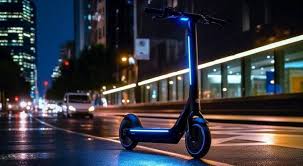As cities around the world grapple with traffic congestion, elektrische step legaal pollution, and the pressing need for sustainable transportation, electric scooters have emerged as a popular solution. With their compact size, eco-friendliness, and ease of use, electric scooters offer a convenient and efficient way to navigate urban landscapes. This article explores the rise of electric scooters, their benefits, challenges, and the future of urban mobility.
What Are Electric Scooters?
Electric scooters, or e-scooters, are two-wheeled vehicles powered by an electric motor. They typically feature a platform for the rider to stand on, handlebars for steering, and are equipped with rechargeable batteries. Unlike traditional scooters or bicycles, e-scooters provide a motorized experience, allowing riders to travel faster and with less physical exertion.
The Benefits of Electric Scooters
1. Environmental Impact
One of the most significant advantages of electric scooters is their environmental impact. Unlike gas-powered vehicles, e-scooters produce zero emissions during operation. Their adoption can lead to reduced air pollution and lower greenhouse gas emissions, making them an attractive alternative for eco-conscious urban dwellers.
2. Traffic Decongestion
Electric scooters can help alleviate traffic congestion in crowded urban areas. They require less space on the road compared to cars, allowing for more efficient use of existing infrastructure. By providing a convenient option for short trips, e-scooters can decrease the number of cars on the road, contributing to smoother traffic flow.
3. Cost-Effectiveness
E-scooters are generally more affordable than owning and maintaining a car. Many cities offer scooter-sharing programs that allow users to rent scooters for a short period, making them a cost-effective option for commuting. The low operational costs, combined with the potential for reduced public transportation fares, make e-scooters an economically attractive alternative.
4. Convenience and Flexibility
E-scooters provide a level of convenience that traditional transportation methods often lack. With the ability to easily navigate through traffic and find parking in tight spaces, riders can reach their destinations quickly. Moreover, they are ideal for short distances, making them perfect for last-mile transportation solutions.
Challenges Facing Electric Scooters
Despite their many benefits, electric scooters face several challenges that cities must address to maximize their potential:
1. Safety Concerns
Safety is a significant concern for e-scooter riders and pedestrians alike. The risk of accidents can increase in areas with heavy traffic, and the lack of dedicated lanes for scooters may lead to dangerous situations. Education campaigns and infrastructure improvements are essential to enhance safety for all road users.
2. Regulation and Infrastructure
The rapid growth of electric scooter usage has prompted many cities to implement regulations governing their operation. These regulations can include speed limits, designated parking areas, and age restrictions. However, inconsistent regulations across regions can create confusion and hinder the widespread adoption of e-scooters.
3. Maintenance and Longevity
While electric scooters offer convenience, their maintenance is crucial for safety and longevity. Issues such as battery depletion, mechanical failures, and vandalism can impact their availability and reliability. Companies operating e-scooter fleets must invest in regular maintenance and monitoring to ensure that scooters remain in good condition.
The Future of Electric Scooters
The future of electric scooters looks promising as technology continues to evolve and cities adapt to changing mobility needs. Innovations in battery technology, such as increased range and faster charging times, will enhance the overall user experience. Additionally, advancements in smart technology can facilitate better fleet management and maintenance tracking.
As cities invest in expanding cycling and pedestrian infrastructure, the integration of e-scooters into public transportation systems will likely become more common. Collaborations between scooter-sharing companies, local governments, and transit authorities can create a more cohesive transportation network, promoting sustainable urban mobility.
Conclusion
Electric scooters represent a shift toward more sustainable, efficient, and user-friendly urban transportation options. While challenges remain, the potential benefits of e-scooters in reducing traffic congestion, lowering emissions, and providing a convenient alternative to traditional vehicles are significant. As cities continue to embrace innovation in mobility solutions, electric scooters are poised to play a crucial role in shaping the future of urban transport. https://e-lectrified.nl/

